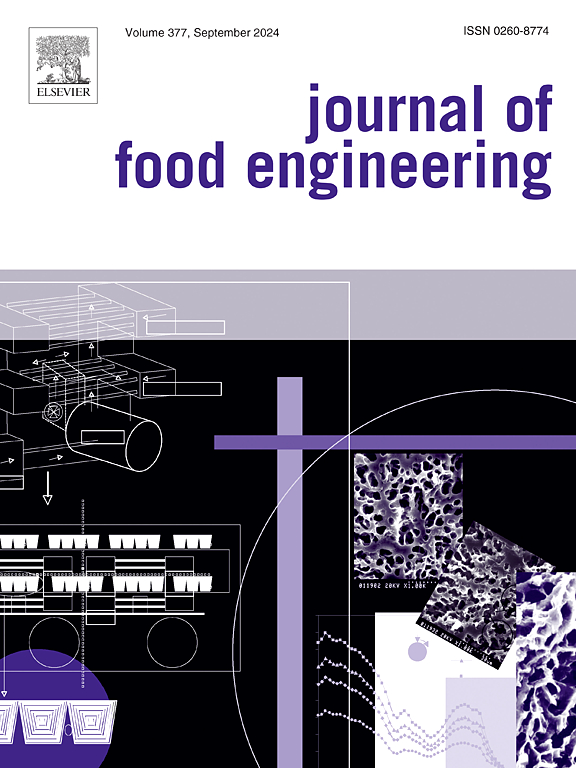小麦面包欧姆烘烤工艺参数对理化品质属性的影响
IF 5.3
2区 农林科学
Q1 ENGINEERING, CHEMICAL
引用次数: 0
摘要
研究了欧姆烘焙作为传统烘焙的节能替代品在小麦面包生产中的潜力,尤其关注面包的质量参数。评估了特定功率输入(1-5 kW/kg)和各种平行板处理室配置对理化参数的影响。与传统烘焙相比,高功率输入(5 kW/kg)下的欧姆烘焙缩短了 98% 的烘焙时间。然而,在产品质量方面,较低的功率输入水平(≤ 3 kW/kg)显示出更均匀的面包屑结构和更高的淀粉蒸煮度。电极较厚(≥ 5 毫米)和产品表面积较小的处理室与处理不均匀有关,导致产品损耗较高和面包体积较小。这些结果凸显了功率输入和处理室设计作为控制工具的重要性,可用于定制欧姆烘焙概念,以获得特定的产品特性。此外,还确定了在加热阶段之后需要有一定的保温时间,以获得与传统烘焙面包相当的产品质量。本文章由计算机程序翻译,如有差异,请以英文原文为准。
Ohmic baking of wheat bread – effect of process parameters on physico-chemical quality attributes
The potential of ohmic baking as an energy-efficient alternative to conventional baking was investigated in wheat bread production, with a particular focus on bread quality parameters. The effects of specific power input (1–5 kW/kg) and various parallel plate treatment chamber configurations were evaluated regarding resulting physico-chemical parameters. Ohmic baking at high power inputs (5 kW/kg) reduced baking times by 98 % compared to conventional baking. Concerning product quality, however, lower power input levels ( 3 kW/kg) revealed specific benefits in terms of a more uniform crumb structure and higher degrees of starch cooking. Treatment chambers with thick electrodes ( 5 mm) and decreased product surface area were associated with treatment inhomogeneities that resulted in higher product losses and lower bread volume. The results underline the importance of power input and treatment chamber design as control tools for tailored ohmic baking concepts to attain specific product properties. The necessity for a subsequent holding time after the heating phase was ascertained to achieve product quality comparable to conventionally baked breads.
求助全文
通过发布文献求助,成功后即可免费获取论文全文。
去求助
来源期刊

Journal of Food Engineering
工程技术-工程:化工
CiteScore
11.80
自引率
5.50%
发文量
275
审稿时长
24 days
期刊介绍:
The journal publishes original research and review papers on any subject at the interface between food and engineering, particularly those of relevance to industry, including:
Engineering properties of foods, food physics and physical chemistry; processing, measurement, control, packaging, storage and distribution; engineering aspects of the design and production of novel foods and of food service and catering; design and operation of food processes, plant and equipment; economics of food engineering, including the economics of alternative processes.
Accounts of food engineering achievements are of particular value.
 求助内容:
求助内容: 应助结果提醒方式:
应助结果提醒方式:


